|
|
|
Sort Order |
|
|
|
Items / Page
|
|
|
|
|
|
|
| Srl | Item |
| 1 |
ID:
145867
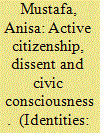

|
|
|
|
|
| Summary/Abstract |
British Muslims have confronted numerous challenges since 9/11 which have rendered their citizenship ‘precarious’ and ‘contingent’, including rampant Islamophobia and a disproportionate impact from tighter security and immigration measures. Additionally, they are also disadvantaged by new forms of governance which promote ‘active citizenship’ based on both neoliberal and resurgent nationalist demands for citizens to be more self-reliant as welfare provision shrinks. This article explores how young British Muslim civil society activists negotiate some of these challenges by analysing their discourses on citizenship and belonging. Based on an ethnographic study, it is suggested that despite experiencing exclusion and marginalisation, young Muslim activists incarnate active citizenship but with reference to a very different set of values and priorities in contrast to nationalist and neoliberal normative ideas. Demonstrating a strong commitment to civic responsibility and participation, these young Muslims defy fears that negative associations with Britishness weaken the value and relevance of citizenship.
|
|
|
|
|
|
|
|
|
|
|
|
|
|
|
|
| 2 |
ID:
145865
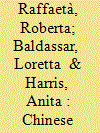

|
|
|
|
|
| Summary/Abstract |
This article explores the experiences of young people of Chinese background in Prato (Italy). Despite significant social exclusion, young Chinese develop a sense of belonging to Prato by creating local, translocal and transnational affiliations and interconnections. These relationships contribute to making an often overtly hostile local reality, liveable and meaningful. A central aim of this article is to examine the intersection between migration studies and youth studies. The former tend to focus on the processes of identity formation featuring ethnic background, hence the label ‘second generation’. In contrast, the latter tend to foreground age- and generation-specific practices of belonging that may extend beyond ethnic identification, hence the focus on ‘youth’. We argue that bringing migration and youth studies together – by complicating notions of home and host, migrant and local identity and belonging – helps us to better understand how young people are managing multiplicity and mobility (and situatedness and stasis/fixity).
|
|
|
|
|
|
|
|
|
|
|
|
|
|
|
|
| 3 |
ID:
145868


|
|
|
|
|
| Summary/Abstract |
This article explores the use of participatory methods in a research project with young people in return migrant families. In-depth children-centred participatory research was conducted with children and young people who had moved to Ireland with their Irish return migrant parents during the recent ‘Celtic Tiger’ era. I argue that the use of multimodal and participatory methods in research with young migrants enables participants to express multiple identities and complex narratives of self. People frequently perform different identities in different contexts, but young migrants in particular, because of the disruptions and incoherences associated with their migrancy and their complex social and cultural positionings, can express ambiguous and apparently contradictory narratives of self. Recognising that research is a process of coconstructing meaning, I highlight the importance of using multimodal methods in research with young migrants, showing how different modes of coconstructing meaning can allow different and ambiguous narratives of self to be articulated.
|
|
|
|
|
|
|
|
|
|
|
|
|
|
|
|
| 4 |
ID:
145863
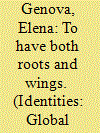

|
|
|
|
|
| Summary/Abstract |
Bulgarian migrants and university students in particular have recently fallen into the spotlight of British media, firmly positioned within fervent immigration debates. Drawing on Brewer’s concept of nested identities, this paper explores how Bulgarian university students in the UK manage four different identifications: national, European, migrant and student. Thus, the process of establishing nested identities is investigated on three different contextual levels: the transnational, regional and the everyday (at university and at the workplace). Paying particular attention to the factors that influence the process, this article also scrutinises its implications for Bulgarian students’ values and perceptions. Utilising semi-structured interviews and participant observation with Bulgarian students, this paper will argue that the four identifications emerge as highly dynamic, context-specific and constantly negotiated relationships. Retrospectively, this article aims to contribute not only to current literature on Bulgarian migration but also to wider debates on transnational youth identities.
|
|
|
|
|
|
|
|
|
|
|
|
|
|
|
|
| 5 |
ID:
145862
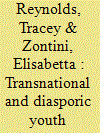

|
|
|
|
|
| Summary/Abstract |
This special issue brings together multidisciplinary and international perspectives on the importance of diasporic and transnational networks for the formation of ethnic identity by migrant youths. Within the context of this issue migrant youths refer to young people (aged 16–35 years) who are themselves migrants or are children and grandchildren of migrants. Our attention to the transnational and diasporic identities of migrant youths is in direct response to policy debates and migration scholarship in this area, which in recent times have focused on the supposed crisis of minority ethnic youths and their perceived marginalisation and social exclusion from a wider society. The special issue broadens the parameters of this debate by exploring not how transnational migrant youths are but more interestingly, we believe, what it means for them to have grown up in a transnational social field. In the special issue rather than simply addressing identity outcomes, we want to emphasise identity processes. This is because we are more interested in understanding the ways the migrant youths are ‘doing transnationalism’ and also through this process ‘doing identity’ (including intersected racial, ethnic, gender, class and sexual identities).
|
|
|
|
|
|
|
|
|
|
|
|
|
|
|
|
| 6 |
ID:
145866


|
|
|
|
|
| Summary/Abstract |
With the emergence of an adult generation of descendants of migrants who are entering the labour market, marrying and having children, questions of transnationalism are made current in new ways. This article engages in the discussion of transnationalism and ‘the second generation’ by taking the everyday life of families as a starting point for discussing the role and meaning of what can be defined as transnational practices. The practice in question is the use of online Quran courses among families of Pakistani background in Norway. Employing Levitt and Glick Schiller’s distinction between ways of being and ways of belonging in transnational social fields, this article discusses how to understand this practice and its transnational dimensions.
|
|
|
|
|
|
|
|
|
|
|
|
|
|
|
|
| 7 |
ID:
145864
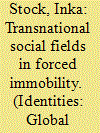

|
|
|
|
|
| Summary/Abstract |
This article explores the relationship between forced immobility and the transnational identity of young Sub-Saharan African migrants in Morocco. The data presented in this article suggest that the extent to which people are able to make their transnational social fields work for them depends on the political, legal and social environment they find themselves in and the position they occupy within their host and home communities. The article demonstrates that such factors influence mobility options and the use of modern technologies among young Sub-Saharan African migrants in Morocco. They also lead to changes in the dynamics of their contact and relationships with family members in the home communities, which can become fractured over time. This means that life in transnational social fields can have a negative effect on the young migrants’ view of themselves and on their life course.
|
|
|
|
|
|
|
|
|
|
|
|
|
|
|
|
| 8 |
ID:
145869


|
|
|
|
|
| Summary/Abstract |
How are online and social media being used in transnational spaces? This article presents empirical findings from a study of the Facebook usage among the Uyghur diaspora. We demonstrate how online identities are negotiated and developed through social media use, and in turn how the expression of identity online is contributing to Uyghur diasporic identity. Drawing upon a content analysis of Facebook sites, we attend to the construction of Uyghur ethnic identity within Facebook group sites and the ways Uyghur political identity is currently being developed online, providing insight into how Facebook is serving as a space for global, daily online interactions. The examination of discussions on Facebook sites indicates that online Uyghur identity has a youthful, emergent character, actively being explored and produced through social media use.
|
|
|
|
|
|
|
|
|
|
|
|
|
|
|
|
|
|
|
|
|